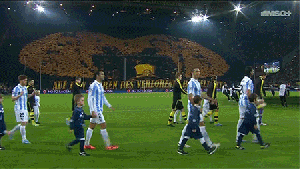
Stoke City Fans invade following promotion to Premier League in 2008.
Craziness will rule the soccer/football world for the next month. Between now and late May, the season will draw to a close and all of the promotion/relegation battles of Europe will be sorted out.
Some of these are far less dramatic than others: England, Scotland and Germany have all crowned their champions ridiculously early by any standard (Man U, Celtic, and Bayern Munich respectively). But there remains a large number of other domestic leagues and the entire pyramid of subordinate leagues that are still in the process of determining who goes up and who goes down. Yes this may seem like a foreign concept to the North American sports fan, but if a team has an horrible, terrible, no good, very bad season then they get sent to the league lower down. Rather than rewarding poor performance with a good player, they just kick the team out of the league and replace it with the winner of the next best league.
But I digress, what I really want to write about is the importance all the games take on for the various battles that are part of promotion/relegation. For many teams, promotion was never really the goal – they just got promotion to their current league, weak crop of players, financial limitations, stadium restrictions prevent promotion anyway, etc. They may have more to fear from the other end of the table, which makes that moment they escape relegation feel like they’ve just won a trophy.
In contrast to the solo pitch invasion earlier this season during the Manchester derby, the massive “we (didn’t get relegated/won promotion) pitch invasion” works entirely differently than the aggressive assault on the opposition players that occurs at other times. Now part of it has to do with timing, in that the celebratory invasion takes place at the final whistle, rather interrupting the match itself. A proper pitch invasion should also occur during a home game, it isn’t really possible to flood the field with visiting supporters in most cases. If the visitors did invade the pitch, it would no longer be construed as a celebratory act, it would be the invasion of the home side’s space, and could not be well-received by the home fans. So despite the fact that these mass pitch invasions involve hundreds to thousands of supporters, the incidences of hooliganism (which has resurfaced over the last two weekends in England) are not really there – people are too happy to fight. Well, most of them. The invasion itself is a transgressive act – the stewards will still try to stop the first few before they beat a hasty retreat, and the act itself is reserved for the most important occasions – trophies or promotion. It is a moment where the fans actually possess the space that they’ve been defending all season, despite never being allowed on it. It is there moment of unity with their team, where both can share the field (even if the players usually flee for the changerooms as the whistle sounds).
Here are Barnet’s fans celebrating. (Language NSFW) What are they celebrating? Not promotion, not a trophy. This pitch invasion is to celebrate that they aren’t being relegated out of the English Football League 2. Note in the video, the drama is enhanced by a last minute penalty save, and that the steward still tries to stop the cameraman from entering the field. Much of the celebration then takes place outside the entrance to the tunnels where the Barnet fans sing to celebrate finishing 20th in a 24 team league. Barnet’s Underhill Stadium capacity is 2302 seated , which isn’t overwhelming, but consider that this stadium was packed to watch a team near the bottom of the 4th division of English football to get an idea of how popular the sport is.
Now to turn it up a bit, Cardiff City FC secured promotion last week, and this isn’t just promotion, but entry into the Premier League. The big show (with a massive TV payout to go with it). This video makes the Barnet invasion look quaint, as Cardiff City Stadium holds 26,000 fans. Watch the players and officials flee, even the stewards make a run for it, and within a minute the crowd has emptied onto the field. Again, the singing and celebration of the moment, without much of the stupid side of soccer that non-followers know all too much about.
So the ground that is taboo for most of the season then becomes for these few moments, the place where fans can celebrate together and celebrate “their” victory for the season, however big or small.




